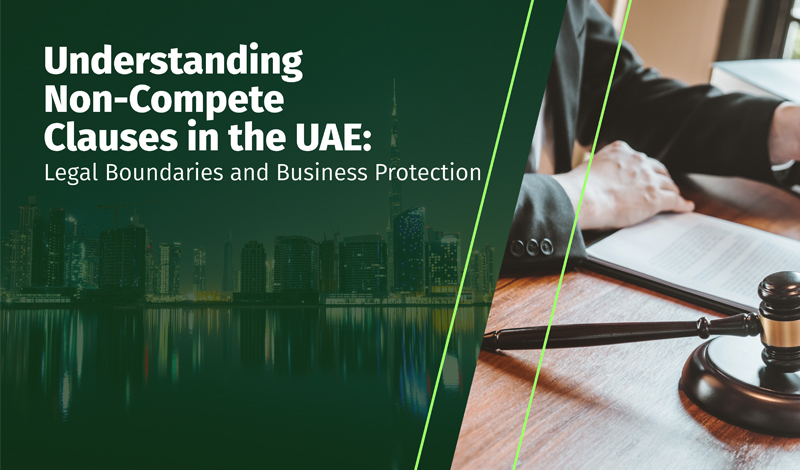In today’s competitive business landscape, protecting proprietary information and client confidentiality is essential. One of the most commonly used tools for this purpose is the non-compete clause—a contractual provision that restricts an employee or contractor from engaging in competing activities after leaving a company.
Legal Basis in the UAE- Under Article 127 of the UAE Labour Law (Federal Law No. 8 of 1980), employers may include a non-compete clause in employment contracts to prevent former employees from working with competitors or starting a competing business. However, such clauses must meet specific legal criteria to be enforceable.
Enforceability Conditions- To be valid, a non-compete clause must be:
- Limited in time: Typically not exceeding 6–12 months.
- Geographically reasonable: Restricted to the region where the employer operates.
- Relevant to the job scope: Only applicable if the employee had access to sensitive business information.
Overly broad or indefinite restrictions are likely to be struck down by UAE courts.
Commercial Implications- Non-compete clauses are particularly relevant in industries like legal consultancy, finance, technology, and healthcare, where client data and trade secrets are critical. Employers must balance protection with fairness, ensuring clauses do not unjustly limit future employment.
Geographic Scope Across Emirates- Non-compete causes are only valid across all emirates if these clauses are reasonable and in line with the labour laws and regulations of the country. The court will look into such restriction and ensure they are justified geographically, they are for a specific time period and is in relation to that employee’s role. If the employer doesn’t have business in the other emirates, then they cannot ban the employer from working in that emirate in the same field. For example, restricting a former employee from working in Abu Dhabi when the employer only operates in Dubai may be deemed excessive. Employers must balance protection with fairness, and employees should seek legal advice before accepting or challenging such clauses.
At Ayesha AlDhaheri Advocates and Legal Consultants, we assist businesses in drafting enforceable non-compete clauses and advise employees on their rights and obligations. Whether you’re negotiating a new contract or facing a post-employment restriction, our team provides strategic legal guidance tailored to UAE law.
UNDERSTANDING NON-COMPETE CLAUSES IN THE UAE: WHAT EMPLOYERS AND EMPLOYEES SHOULD KNOW:
In a competitive market like the UAE, businesses often rely on non-compete clauses to protect sensitive information, client relationships, and market position. These clauses are typically included in employment contracts to prevent former employees from working with direct competitors or starting a similar business after leaving their role.
What Does the Law Say?
Under Article 127 of the UAE Labour Law (Federal Law No. 8 of 1980), employers are allowed to include non-compete clauses in employment contracts. However, for these clauses to be legally enforceable, they must meet specific conditions.
When Is a Non-Compete Clause Valid?
To be upheld by UAE courts, a non-compete clause must be:
- Time-bound: Usually limited to 6–12 months after the end of employment.
- Geographically reasonable: Restricted to areas where the employer actively operates.
- Relevant to the employee’s role: Only applicable if the employee had access to confidential business information or client data.
If a clause is too broad, indefinite, or unfairly restricts future employment, it may be rejected by the courts.
Can It Apply Across Emirates?
A non-compete clause that bans work across all seven emirates is unlikely to be considered valid—unless the employer has a business in all the emirates. For example, an employer based only in Dubai cannot reasonably prevent a former employee from working in Abu Dhabi in the same field. The restriction must be justified, proportionate, and clearly linked to the employee’s previous role.
Why It Matters
Non-compete clauses are especially important in industries like legal services, finance, healthcare, and technology, where protecting trade secrets and client trust is essential. But employers must balance business protection with fairness, and employees should understand their rights before signing or challenging such clauses.
At Ayesha AlDhaheri Advocates and Legal Consultants, we help businesses draft enforceable non-compete clauses and advise professionals on their legal obligations. If you’re negotiating a contract or facing a post-employment restriction, our team is here to guide you.

